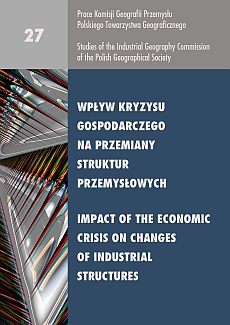Renewable energy in the European Union in the context of economic crisis
DOI:
https://doi.org/10.24917/20801653.27.8Keywords:
energy security, economic crisis, renewable energy sources, energy-climate package, energy policy UE, Feed in Tariffs – FiT EUAbstract
Nowadays, the use of renewable energy in the European Union, as well as around the world seems to be unavoidable due to many factors. One of the main reasons are environmental benefits related to greenhouse gases emissions avoidance. Another very important result is the increase of the EU energy security through energy supplies diversification and the decentralization of production. Moreover, the use of renewable energy reduces the need for conventional raw materials such as oil, gas, or coal. The problem of depletion and regeneration of resources does not exist while using renewable energy sources. All these advantages are becoming increasingly important for the European Union, especially in times of rising prices of raw materials, often gas crises or economy decarbonisation process. Nevertheless, the economic crisis sparked a debate all across the European Union, on the costs related to electricity production from renewable energy sources. The fight against unemployment, public debt and the declining competitiveness of the EU economy, which is also connected with high electricity costs, forced a number of countries (even the leaders in the industry) to reduce support for these energy sources, which also caused the slowdown in their development.
Downloads
Metrics
References
Chińskie wiatraki zaleją Europę (2011) (2014, 13 października). Pozyskano z http://ioze.pl/energetyka- wiatrowa/aktualnosci/hinskie-wiatraki-zaleja-europe
Dyrektywa Parlamentu Europejskiego i Rady w sprawie promowania stosowania energii ze źródeł odnawialnych (2008). Bruksela, KOM (2008), 19 wersja ostateczna 2008/0016 (COD).
EU Energy, transport and environment indicators – 2013 edition. Luxembourg: Publications Office of the European Union, 2013.
Glachant, J.M., Lévêque, F. (2009). Electricity Reform in Europe. Towards a Single Energy Market. UK, Notrthampton, MA, USA: Edward Elgar.
Hiszpania nie będzie liderem w wiatrowniach. Rzeczpospolita, 5 lutego 2012.
Komunikat Energia odnawialna: istotny uczestnik europejskiego rynku energii (2012). COM (2012), 271.
Lewandowski, W.M. (2006). Proekologiczne odnawialne źródła energii. Warszawa: Wydawnictwa Naukowo-Techniczne.
Ligus, M. (2010). Efektywność inwestycji w odnawialne źródła energii. Analiza kosztów i korzyści. Warszawa: Wydawnictwa C e DeWu.
Meadows, D.H., Meadows, D.I., Randers, J., Behrens, W. W. (1972). The Limits to Growth. Abstract Established by Eduard Pestel. A Report to The Club of Rome. New York: Universe Books.
Motowidlak, T. (2012). Wpływ kryzysu finansowego strefy euro na rozwój sektora energii odnawialnej w UE. Acta Universitatis Lodziensis, Folia Oeconomica, 273.
National Overall Share and Targets for the Share of Energy from Renewable Sources in Gross Final Consumption of Energy in 2020. (2013, 25 września). Pozyskano z http://ec.europa.eu/energy/ renewables/targets_en.htm
Pach-Gurgul, A. (2012). Jednolity rynek energii elektrycznej w Unii Europejskiej w kontekście bezpieczeństwa energetycznego Polski. Warszawa: Difin.
Pyka, J. (red) (2007). Szanse i zagrożenia rozwoju rynku energetycznego w Europie i Polsce. Katowice: Wydawnictwo Akademii Ekonomicznej w Katowicach.
Solar subsidies cut by more than half (2011). The Guardian, 28th October 2011.
Status of Photovoltaics in the European Union New Member States 2010 (2011). Warszawa: Warsaw University of Technology.
System wsparcia dla energetyki odnawialnej we Włoszech potrzebuje zmian (2013, 13 listopada). Pozyskano z http://www.radanpre.pl/index.php?option=com_content&view=article&id=411:system- -wsparcia-dla-energetyki-odnawialnej-we-woszech-potrzebuje-zmian&catid=14:wiadomociklimatyczno- energetyczne&Itemid=44
Wyzwania i polityka w zakresie energii (2013). Sprawy przedłożone przez Komisję na posiedzenie Rady Europejskiej w dniu 22 maja 2013.
Zielona księga. Ramy polityki w zakresie klimatu i energii do roku 2030 (2013, 13 listopada). Pozyskano z http://eur lex.europa.eu/LexUriServ/LexUriServ.do?uri=COM:2013:0169:FIN:PL:PDF
Downloads
Published
How to Cite
Issue
Section
License
Articles are published under the terms of the Creative Commons License (CC BY-ND 4.0; Attribution– NoDerivs).

